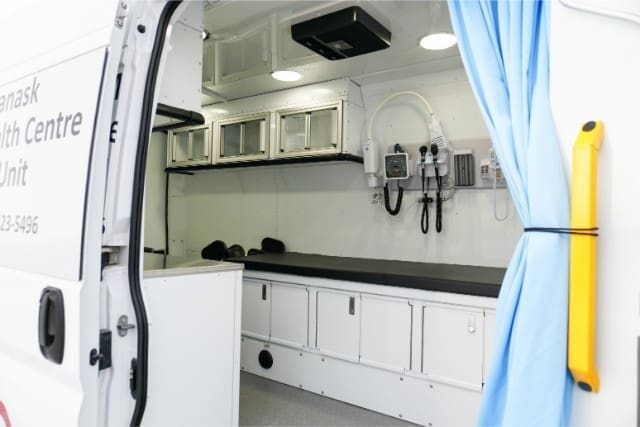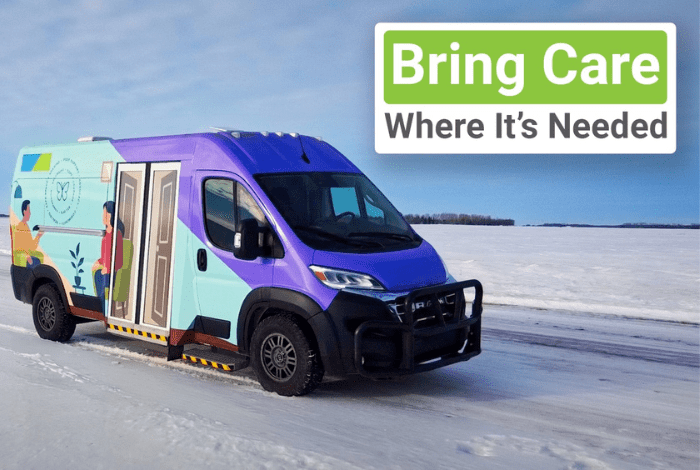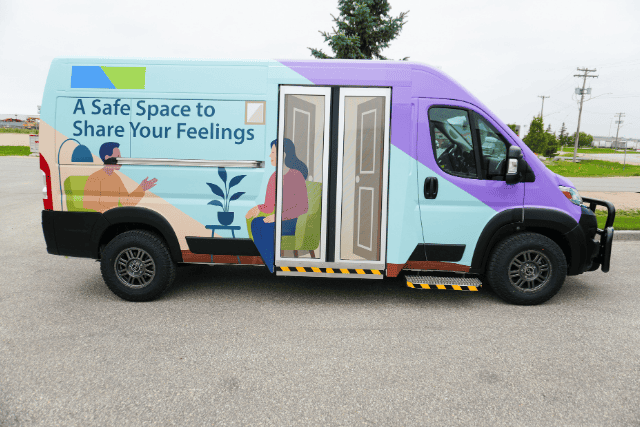Did you know that more than 450 ethnic and cultural groups live in Canada? That means patients come from many different backgrounds, speak different languages, and have unique beliefs about healthcare. But here’s the problem: not all healthcare programs are set up to provide culturally sensitive care.
When healthcare doesn’t respect a patient’s culture, they may feel unheard, misunderstood, or even unsafe.
This can lead to:
- Patients misinterpreting their diagnosis
- Missed appointments
- Delayed treatment
For mobile healthcare programs, this creates a big gap. If patients don’t trust the healthcare they’re getting, they won’t use it. That means worse health outcomes, more emergency room visits, and a healthcare system that isn’t working for everyone.
At MoveMobility, we’ve spent over 20 years helping organizations bring healthcare directly to the communities in Canada that need it most. Our Ford QVM– and Stellantis QPro-certified mobile medical units are built to remove barriers to care. We’ve worked with organizations like yours and Quest Community Health Centre, and while we’re experts in mobile medical solutions, we know we’re not the only option. This article is here to give you real, unbiased insights.
In this article, you’ll learn:
- What culturally sensitive care is and why it matters
- How it plays a role in your mobile healthcare program
- Ways to make patient care more inclusive
By the end, you will have practical ideas for closing healthcare gaps and strengthening your mobile healthcare program.
Culturally sensitive care definition
Culturally sensitive care is sometimes referred to as culturally appropriate care. It means providing healthcare that respects a person’s culture, beliefs, and values. If you live in Canada, you know that people come from many different backgrounds. They may speak different languages, have special traditions, or believe in certain treatments. If healthcare providers don’t understand this, patients might feel confused and uncomfortable.
Why is culturally sensitive care important?
Imagine going to the doctor and not understanding what they’re saying. Maybe they don’t speak your language, or they don’t respect your beliefs. Would you feel comfortable? Would you go back? This happens to many people when healthcare isn’t culturally sensitive.
When healthcare doesn’t respect a patient’s culture, they may:
- Avoid going to the doctor because they don’t feel welcome.
- Struggle to understand their treatment if there’s a language barrier.
- Feel disrespected, making them less likely to follow medical advice.
This leads to worse health, more emergency room visits, and higher healthcare system costs. When people don’t get regular care, minor health problems can turn into big ones, which is bad for both the patient and the entire community.
But when healthcare providers take the time to listen and understand, everything changes. Patients trust their doctors, feel safe, and get the care they need. They’re more likely to come back for check-ups and follow medical advice.
Culturally sensitive care is essential for mobile healthcare teams like yours. It builds trust, improves health, and ensures that no one is left behind.
Culturally sensitive care examples
A mobile healthcare team meets people of all cultures exactly where they are. That means they have to be flexible and aware of different cultural needs.
Here are some examples of providing culturally sensitive care:
Helping Indigenous communities: A mobile clinic visits a remote Indigenous community. The team partners with local Elders and traditional healers. This helps build trust and makes sure healthcare respects cultural healing practices. Staff also learn about Indigenous traditions so patients feel safe and understood.
Supporting newcomers to Canada: Some patients don’t speak English or French. A mobile clinic in a diverse neighborhood brings interpreters and translated medical forms so patients understand their care. Instead of feeling lost or confused, they can ask questions and make informed decisions about their health.
Respecting religious needs: A Muslim woman needs care but feels uncomfortable seeing a male doctor. The mobile clinic schedules female healthcare providers for patients who prefer same-gender care. This small change makes a huge difference in patient comfort and trust.
Caring for refugees who have been through trauma: Canada has welcomed almost 1,100,000 refugees since 1980. A mobile healthcare team trained in culturally sensitive trauma-informed care knows to speak gently, give patients choices, and create a calm environment. This helps patients feel safe instead of overwhelmed.
When a mobile healthcare team takes the time to understand different cultures, patients feel more comfortable, respected, and willing to get the care they need.
How to provide culturally sensitive care
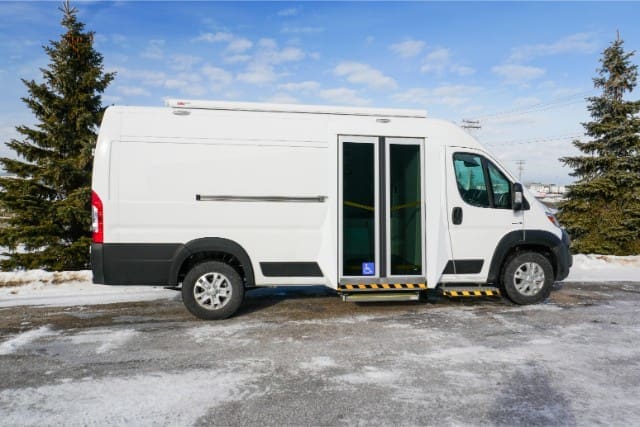
If your mobile healthcare team serves diverse communities, culturally sensitive care is a must. It helps patients feel comfortable, understood, and willing to get the care they need. Here are five ways your team can provide culturally sensitive care in Canada.
1. Offer language support
Many patients in Canada speak a language other than English or French. Without clear communication, they may struggle to understand medical advice. To help:
- Use interpreters when possible.
- Provide translated medical forms in common languages.
- Use simple, clear language when explaining treatments.
2. Respect cultural traditions and beliefs
Different cultures have unique views on health, illness, and treatment. Your team should:
- Ask patients if they have any cultural preferences for their care.
- Be open to alternative healing methods that some patients may follow.
- Respect spiritual and religious practices during medical treatment.
3. Provide gender-sensitive care
Some patients prefer to see a doctor or nurse of the same gender, especially for personal exams. If possible:
- Schedule male and female providers to give patients a choice.
- Use a privacy curtain for healthcare when needed.
4. Build trust with local communities
People are more likely to seek care when they trust the providers. Your team can:
- Partner with community leaders, Elders, or cultural groups.
- Attend local events to connect with the people you serve.
5. Train your team on culturally sensitive care
Your staff should understand how different cultures view healthcare. Offer training on:
- Cultural awareness to avoid misunderstandings.
- Trauma-informed care for refugees or survivors of violence.
When your mobile healthcare team takes these steps, patients feel respected, safe, and more willing to seek care. That leads to better health for everyone.
Want to learn more about culturally sensitive care?
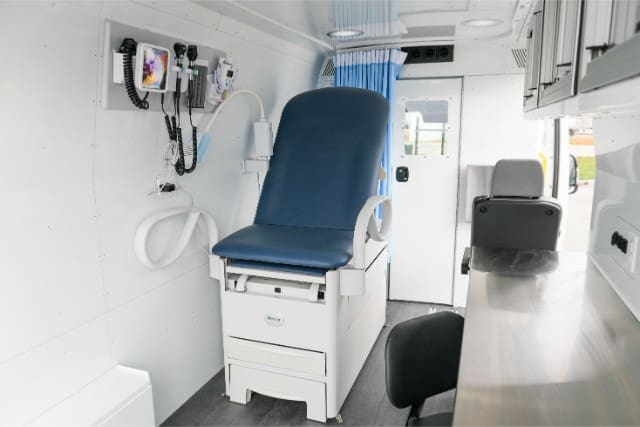
You’re likely here because you see a gap in healthcare. Too many people feel unheard, misunderstood, or even afraid to get medical help. You wanted to know how culturally sensitive care can change that, and now you have real solutions.
Here’s what you learned today:
- What culturally sensitive care is and why it matters.
- Examples of culturally sensitive care
- Five simple ways to make healthcare more welcoming and effective for all patients.
At MoveMobility, we build mobile medical units that help healthcare teams like yours reach more people around Canada. We know that every community has unique needs, and a mobile clinic should reflect that. That’s why we work closely with healthcare providers to design custom vehicles that make care more accessible, private, and comfortable. Our goal is simple—manufacturing solutions that help you provide care that truly meets people where they are.
If you have any questions or want to explore mobile medical options, click the button below to talk to a mobility expert.
Not ready to chat yet? No problem! Check out our other resources to learn more about mobile healthcare.
Start by checking out our article on mobile medical van customization. Reading this will give you a better idea of some of the options you have when customizing your vehicle.


